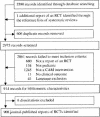Systematic reviews need systematic searchers
- PMID: 15685278
- PMCID: PMC545125
Systematic reviews need systematic searchers
Abstract
Purpose: This paper will provide a description of the methods, skills, and knowledge of expert searchers working on systematic review teams.
Brief description: Systematic reviews and meta-analyses are very important to health care practitioners, who need to keep abreast of the medical literature and make informed decisions. Searching is a critical part of conducting these systematic reviews, as errors made in the search process potentially result in a biased or otherwise incomplete evidence base for the review. Searches for systematic reviews need to be constructed to maximize recall and deal effectively with a number of potentially biasing factors. Librarians who conduct the searches for systematic reviews must be experts.
Discussion/conclusion: Expert searchers need to understand the specifics about data structure and functions of bibliographic and specialized databases, as well as the technical and methodological issues of searching. Search methodology must be based on research about retrieval practices, and it is vital that expert searchers keep informed about, advocate for, and, moreover, conduct research in information retrieval. Expert searchers are an important part of the systematic review team, crucial throughout the review process-from the development of the proposal and research question to publication.
Figures

References
-
- Medical Library Association. Using scientific evidence to improve information practice. [Web document]. Chicago, IL: The Association. [rev. 15 Dec 2000; cited 28 Mar 2004]. <http://www.mlanet.org/research/science4.html>.
-
- Cook DJ, Mulrow CD, and Haynes RB. Systematic reviews: synthesis of best evidence for clinical decisions. Ann Intern Med. 1997 Mar 1; 126(5):376–80. - PubMed
-
- Cochrane Reviewers Handbook. 4.2.1 ed. Oxford, UK: Update Software, 2001.
-
- Stevens KR.. Systematic reviews: the heart of evidence-based practice. AACN Clinical Issues. 2001;12(4):529–38. - PubMed
-
- Medical Library Association. Medical Library Association policy statement: role of expert searching in health sciences libraries. [Web document]. Chicago, IL: The Association. [rev. 22 Mar 2004; cited 28 Mar 2004]. <http://www.mlanet.org/resources/expert_search/policy_expert_search.html#2>. - PMC - PubMed
Publication types
MeSH terms
LinkOut - more resources
Full Text Sources
